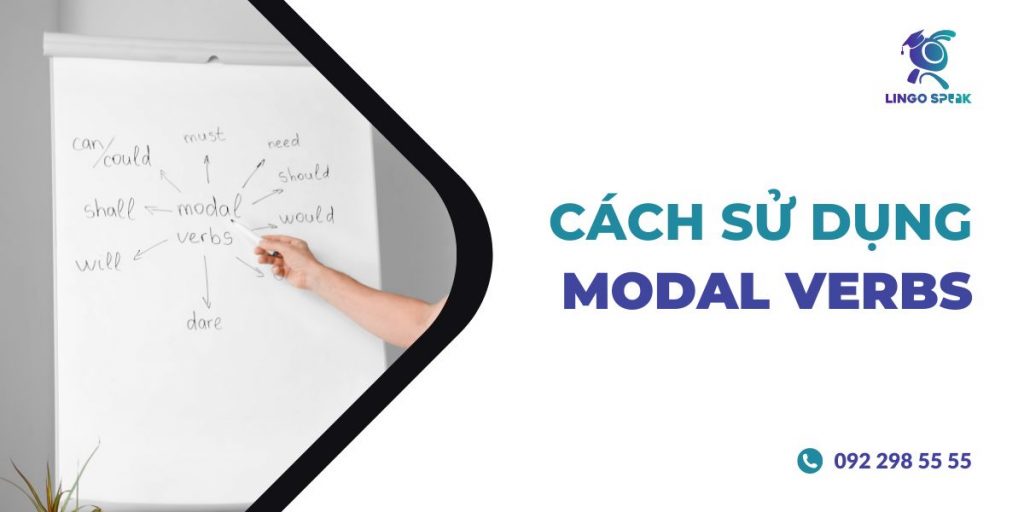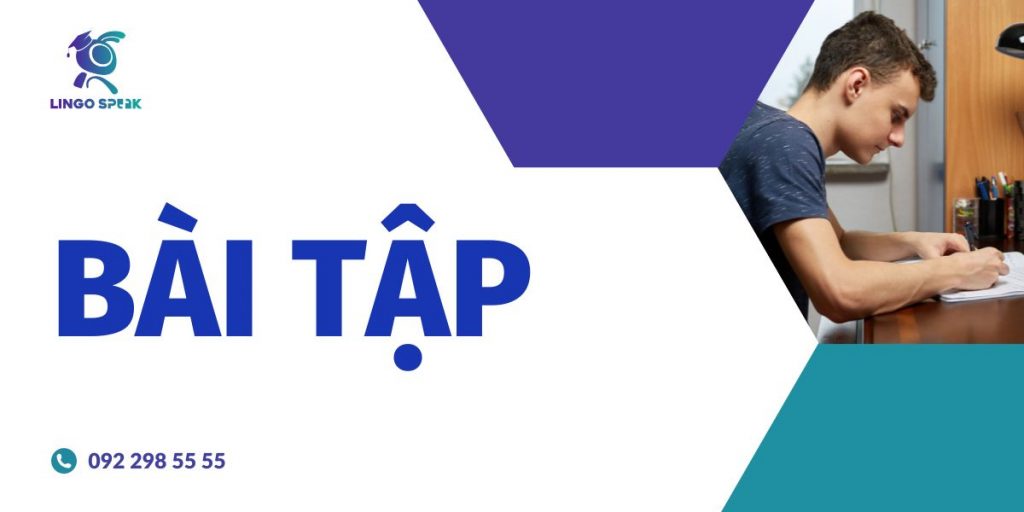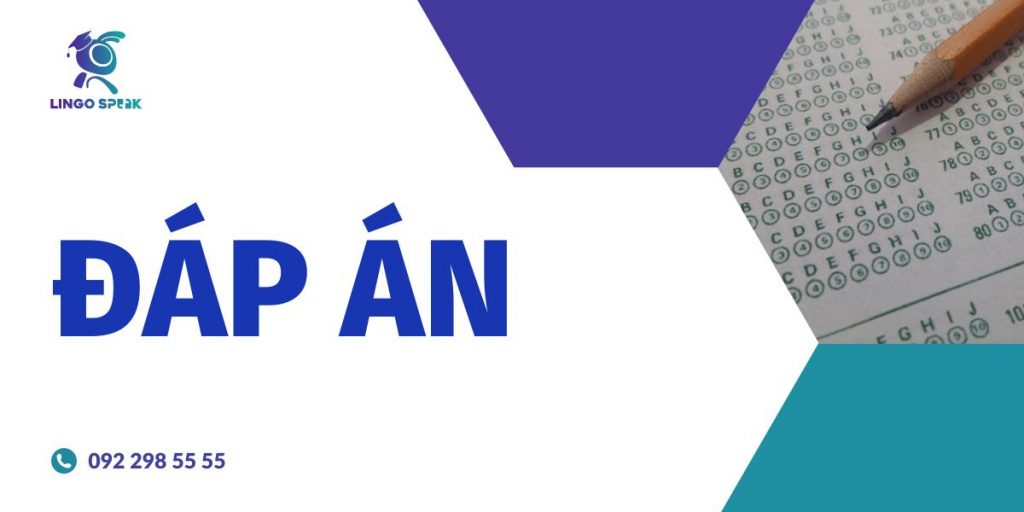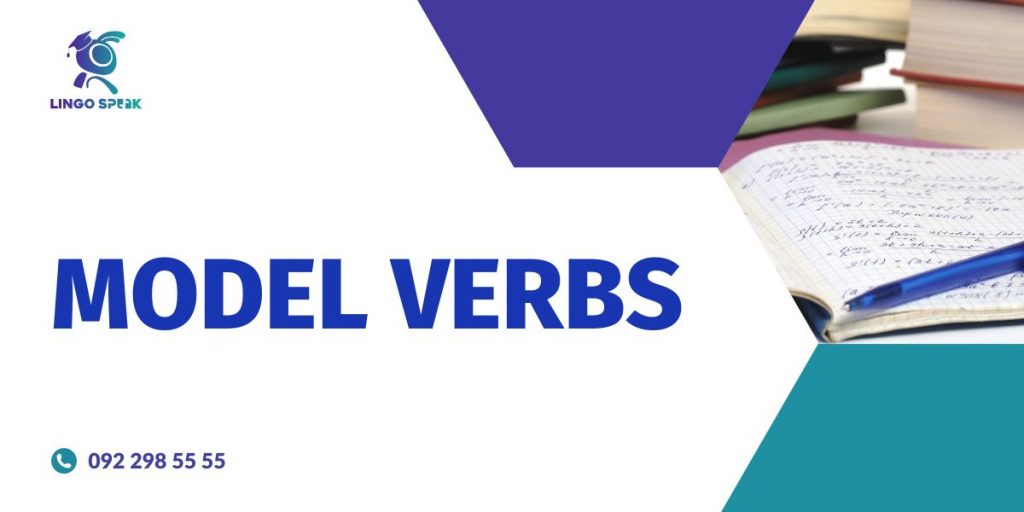Modal verbs là một nhóm động từ trong tiếng Anh được sử dụng để biểu đạt sự ý muốn, khả năng, ý nghĩa, hoặc điều kiện. Chúng không thể tồn tại một mình mà thường đi kèm với một động từ khác (động từ chính) để tạo thành cấu trúc câu hoàn chỉnh. Modal verbs thường thay đổi ý nghĩa của câu, thường phản ánh ý kiến, suy nghĩ, mong muốn hoặc khả năng của người nói.
Đăng ký test trình độ tại: https://forms.gle/yfbmcrQJDSRs3HZ66
Đọc thêm về câu bị động trong tiếng Anh.
Động từ khuyết thiếu Modal Verbs

Các modal verbs thông thường trong tiếng Anh bao gồm: can, could, may, might, must, shall, should, will, would. Mỗi modal verb có ý nghĩa và cách sử dụng riêng biệt, như “can” thể hiện khả năng hoặc khả năng; “may” thể hiện sự cho phép hoặc khả năng; “must” thể hiện sự bắt buộc hoặc chắc chắn; và như vậy.
Modal verbs cũng có thể được sử dụng để thể hiện các mức độ của sự chắc chắn, như “might” chỉ sự không chắc chắn hơn so với “may”, hoặc để diễn đạt sự lịch sự, như “could” thường được sử dụng để yêu cầu một cách lịch sự hơn so với “can”.
Sự linh hoạt và đa dạng của modal verbs khiến chúng trở thành một phần quan trọng của cấu trúc ngôn ngữ trong tiếng Anh.
Phân loại
Dạng động từ khuyết thiếu chính là những cụm từ giúp thể hiện ý định chính của câu mà không cần một động từ chính đầy đủ. Dưới đây là phân loại các dạng động từ khuyết thiếu chính theo một số chủ đề:
- Ability (Khả năng):
- can
- could
- be able to
- Advice (Lời khuyên):
- must
- should
- ought to
- could
- Obligation and Necessity (Nghĩa vụ và Cần thiết):
- must
- have to
- need
- Certainty and Possibility (Chắc chắn và Khả năng):
- will
- would
- may
- might
- can
- could
Lưu ý rằng một số động từ có thể thuộc nhiều nhóm khác nhau tùy thuộc vào ngữ cảnh cụ thể. Đối với các động từ khuyết thiếu chính, người nghe hoặc đọc câu cần dựa vào ngữ cảnh để hiểu ý nghĩa đúng đắn.
Chúng ta cũng có thể phần loại như sau
| Modal Verb | Quá khứ (Past) | Nguyên mẫu (Base) | Nguyên mẫu phủ định (Negative) | Phủ định quá khứ (Negative Past) | Câu hỏi (Question) |
|---|---|---|---|---|---|
| Can | Could | Can | Cannot / Can’t | Could not / Couldn’t | Can / Could + Subject + Verb |
| May | Might | May | May not / Might not | May not have / Might not have | May / Might + Subject + Verb |
| Shall | Should | Shall | Shall not / Shan’t | Should not / Shouldn’t | Shall / Should + Subject + Verb |
| Will | Would | Will | Will not / Won’t | Would not / Wouldn’t | Will / Would + Subject + Verb |
| Must | Had to | Must | Must not / Mustn’t | Didn’t have to / Needn’t have | Must + Subject + Verb |
| Need | Needed | Need | Need not / Needn’t | Didn’t need to / Needn’t have | Need + Subject + Verb |
| Have to | Had to | Have to | Do not have to / Don’t have to | Didn’t have to | Have to + Subject + Verb |
| Ought to | Ought to | Ought to | Ought not to / Oughtn’t to | Didn’t ought to | Ought to + Subject + Verb |
Lưu ý rằng “Ought to” không có dạng quá khứ phức tạp, vì vậy chúng ta sử dụng “Ought to” cho cả hiện tại và quá khứ.
Ví dụ và cách sử dụng
Phân loại theo ý định
- Ability (Khả năng):
- She can speak three languages fluently.
- Could you be able to finish the project by next week?
- Advice (Lời khuyên):
- You should exercise regularly for better health.
- I think you ought to consider their opinion before making a decision.
- Obligation and Necessity (Nghĩa vụ và Cần thiết):
- Students must complete their assignments by the deadline.
- We have to attend the meeting tomorrow.
- Certainty and Possibility (Chắc chắn và Khả năng):
- The sun will rise in the east.
- It might rain later, so you may want to bring an umbrella.
Phân loại theo bảng
- Can:
- Present: I can swim.
- Past: I could swim.
- Negative: I cannot swim. / I can’t swim.
- Negative Past: I could not swim. / I couldn’t swim.
- Question: Can you swim?
- May:
- Present: You may go now.
- Past: You might have been mistaken.
- Negative: You may not go. / You might not go.
- Negative Past: You might not have been mistaken.
- Question: May I go?
- Shall:
- Present: We shall meet at 3 PM.
- Past: We should have arrived by now.
- Negative: I shall not tolerate this. / I shan’t tolerate this.
- Negative Past: We should not have stayed so long.
- Question: Shall we begin?
- Will:
- Present: She will help you.
- Past: He said he would call.
- Negative: They will not come. / They won’t come.
- Negative Past: She said she wouldn’t be late.
- Question: Will you join us?
- Must:
- Present: You must complete the assignment.
- Past: You had to finish the project yesterday.
- Negative: You must not be late. / You mustn’t be late.
- Negative Past: You didn’t have to attend the meeting.
- Question: Must I submit this today?
- Need:
- Present: He needs to study for the exam.
- Past: She needed more time to prepare.
- Negative: You need not worry. / You needn’t worry.
- Negative Past: She didn’t need to ask for help.
- Question: Need we bring anything?
- Have to:
- Present: They have to attend the meeting.
- Past: She had to finish the report yesterday.
- Negative: You do not have to apologize. / You don’t have to apologize.
- Negative Past: He didn’t have to work on weekends.
- Question: Do you have to leave now?
- Ought to:
- Present/Past: You ought to apologize.
- Negative: You ought not to disturb them. / You oughtn’t to disturb them.
- Negative Past: She ought not to have said that.
- Question: Ought I to call them?
Bài tập

Bài tập 1: Chọn đúng dạng Modal Verb phù hợp:
- She is very talented. She __ sing beautifully.
- a) can
- b) must
- c) may
- You __ complete the assignment by tomorrow.
- a) will
- b) should
- c) need
- I’m not sure if I __ make it to the meeting on time.
- a) can
- b) will
- c) may
- You __ have forgotten to turn off the lights before leaving.
- a) can
- b) must
- c) should
- We __ go to the party last night, but we decided to stay home.
- a) needn’t
- b) mustn’t
- c) ought to
Bài tập 2: Hoàn thành câu với động từ Modal phù hợp:
- I’m not sure if I __ attend the conference next week.
- You __ complete this project by the end of the month.
- She __ be at the airport by now. Her flight was at 9 AM.
- We __ go to the doctor yesterday, but we felt better in the evening.
- He __ have known about the surprise party. It was a secret.
Bài tập 3: Sắp xếp từ để tạo câu hoàn chỉnh sử dụng Modal Verbs:
- to / need / the / finish / you / report / urgently.
- may / not / you / take / should / the / car / out / tonight.
- I / to / the / early / will / airport / tomorrow / must / go.
- my / for / help / you / must / ask / I / advice.
- the / can / concert / attend / you / tonight?
Đáp án

Bài tập 1:
- a) can
- b) should
- c) may
- b) must
- a) needn’t
Bài tập 2:
- can
- must
- should
- were going to
- must
Bài tập 3:
- You need to finish the report urgently.
- Should you take the car out tonight?
- I must go to the airport early tomorrow.
- You must ask for my advice.
- Can you attend the concert tonight?





